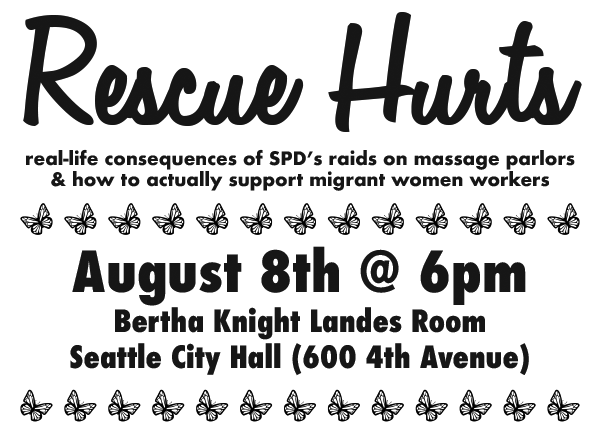On July 28th, 2019, many laws passed by the Washington State legislature earlier this year went into effect, including two laws our community supported: HB 1382 (emergency access) and HB 1756 (dancer safety). Here are what you need to know about these new laws and a request for our dancer friends:
HB 1382 provides immunity for prosecution for prostitution and prostitution loitering charges when we are victims or witnesses of certain violent crimes and seek emergency assistance (medical and police). It is intended to make it easier for sex workers and people in the sex trade to report crimes and seek support, but there are some limitations. They are:
- It only applies to violent crimes. In other words, it does not offer any protection when someone is reporting medical emergencies unrelated to violent crimes. What constitutes a “violent crime” is described in the law, but nobody can be expected to remember that list.
- The law provides immunity from prosecution, but not from arrest.
- It does not protect someone from other charges, including promoting prostitution in the second degree (which sometimes is applied to sex workers working in a pair or friends and family members who provide transportation and other support).
The survey we conducted last year showed deep mistrust of the law enforcement among sex workers and people in the sex trade, so we feel that HB 1382 is not sufficient to make many of us feel safe to report crimes or seek emergency assistance when we experience emergencies. Please keep telling us about what it would take to make this law more effective.
HB 1756 does many things, all of which are geared toward empowering dancers who work in strip clubs to protect their safety. These include:
- The State Department of Labor and Industry will develop a training for adult entertainers (dancers), which will be required before entertainer license can be issued. The training will include rights and responsibilities of workers, reporting of workplace injuries, sexual abuse and harassment, financial management, risk of human trafficking, and resources for assistance. (This portion will go into effect in July 2020.)
- Clubs are required to provide panic button in private (VIP) booths and anywhere else where a dancer would be alone with a customer.
- Clubs must record worker complaints about assault and harassment committed by customers. If an accusation is made under the penalty of perjury or is supported by other evidences, the club must refuse the customer for three years after the incident. Other clubs owned by the same owner must also exclude the customer for three years.
- The Department of Labor and Industry will form an advisory committee to assist with the implementation of the new law, including developing the training. At least half of the committee members must be former or current entertainers who held license for at least five years, and at least one will be an industry representative (the boss). The committee can consider and recommend further legislations to improve dancer safety. (The advisory committee has yet to be formed as of now.)
Many of these provisions are hard to monitor for compliance, but there is at least one that can be easily verified: the panic button. If you work at a strip club, please go and find out if the management has installed a panic button in each area where dancers may be alone with a customer. If it’s possible, ask someone what happens when the button is pressed: Does it actually work? Who will be alerted and will respond to the scene? Please let us know what you find out–we just want to see the level of compliance with the new requirement, and we will not report it to the State or anyone else unless you ask us to. Thank you for your help!
If you are interested in future legislative advocacy, please contact us! Our monthly meetings are open to anyone who support safety and rights for sex workers and people in the sex trade.
